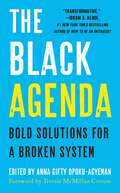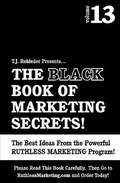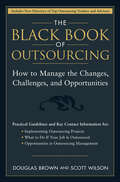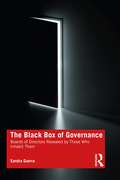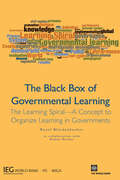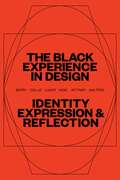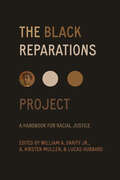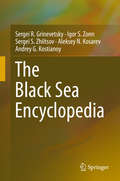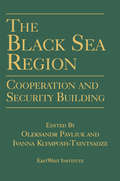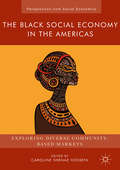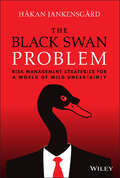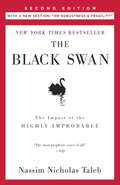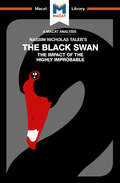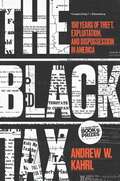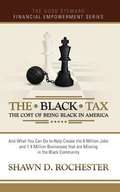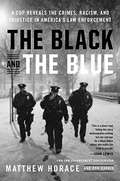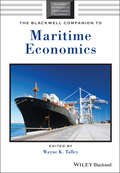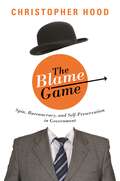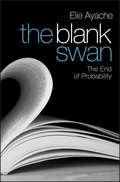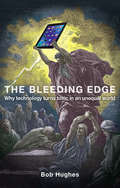- Table View
- List View
The Black Agenda: Bold Solutions for a Broken System
by Anna Gifty Opoku-Agyeman"The Black Agenda mobilizes top Black experts from across the country to share transformative perspectives on how to deploy anti-racist ideas and policies into everything from climate policy to criminal justice to healthcare. This book will challenge what you think is possible by igniting long overdue conversations around how to enact lasting and meaningful change rooted in racial justice." —Ibram X. Kendi, #1 New York Times bestselling author of How to Be an Antiracist and Stamped From the BeginningFrom ongoing reports of police brutality to the disproportionate impact COVID-19 has had on Black Americans, 2020 brought a renewed awareness to the deep-rootedness of racism and white supremacy in every facet of American life. Edited by Anna Gifty Opoku-Agyeman, The Black Agenda is the first book of its kind—a bold and urgent move towards social justice through a profound collection of essays featuring Black scholars and experts across economics, education, health, climate, and technology. It speaks to the question "What's next for America?" on the subjects of policy-making, mental health, artificial intelligence, climate movement, the future of work, the LGBTQ community, the criminal legal system, and much more. Essayists including Dr. Sandy Darity, Dr. Hedwig Lee, Mary Heglar, and Janelle Jones present groundbreaking ideas ranging from Black maternal and infant health to reparations to AI bias to inclusive economic policy, with the potential to uplift and heal not only Black America, but the entire country.
The Black Book Of Marketing Secrets
by T. J. RohlederWhoever said that "marketing takes a day to learn and lifetime to master" was right! For years T.J. Rohleder ("America's Blue Jeans Millionaire") has been keeping journals that are filled with his best marketing ideas. Now he's happy to share some of his favorite ideas with you. This is volume thirteen of the best marketing ideas T.J.'s found and knows to be true.
The Black Book of Outsourcing: How to Manage the Changes, Challenges, and Opportunities
by Douglas Brown Scott WilsonRevised for 2009 and beyond, The Black Book of Outsourcing is a comprehensive guide and directory for the evolving field of outsourcing, including expert advice on how to operate an outsourcing program. Valuable governance checklists, offshoring insights, best practices and one-of-kind resources are featured in this bible of the outsourcing industry. First published in 2005, this topical, bestselling manual explores the evolution of both outsourcing buyers and suppliers. Outsourcing and research gurus Douglas Brown and Scott Wilson chart a course of advice for business leaders charged with managing sourcing initiatives, present a wealth of opportunities for job seekers, and offer insights for entrepreneurial thinkers and investors worldwide
The Black Box of Governance: Boards of Directors Revealed by Those Who Inhabit Them
by Sandra GuerraIn the world of corporate governance, the board of directors is often viewed as the "black box" of companies: only the board members who are seated at the meeting table understand how this "decision-making machine" works. In this book, a board member with over 25 years’ experience pulls off the lid and shows both how boards have worked and how they could work. This book is grounded in extensive research in three different surveys: one with more than 100 Brazilian directors, another with 340 board members from 40 countries, and a final one with 103 Brazilian directors serving on 238 boards. It also includes interviews with Ira Millstein, Sir Adrian Cadbury, Robert Monks and Mervyn King. The inner-workings of the board of directors are revealed: • What keeps directors awake at night • Obstacles to efficient decision-making • Behavioral dynamics, both within the board and in relation to the management • Pitfalls that arise from individual and group biases Based on these insights and the author’s own consulting and board experience, the book presents a guide to behavioral tools enabling directors and executives to confidently navigate the boardroom, improving interactivity and the efficiency of the decision-making process. Intended for directors and executives who are directly involved in the board's activities, as well as for leaders responsible for strategy implementation, this book provides a behavioral compass for all those interacting with the "black box."
The Black Box of Governmental Learning
by Raoul Blindenbacher Bidjan NashatThere are more poor people around the world than ever before. One of the missing factors in efforts to address poverty and increase sustainable development is adequate governmental capacity development. One effective means to improve the quality of democratic governance is by learning from the past and from others' experiences. 'The Black Box of Governmental Learning' introduces the Learning Spiral-a new concept for organizing effective learning events for governments in the 21st century. It helps governments to learn from each other. This theory-based concept has been applied successfully over the past decade in numerous conferences, training, and e-learning events all over the world. The book is directed toward practitioners in governments, such as members of cabinets, parliaments, and courts; civil servants and politicians; civil society organizations; and international organizations. It will help them understand the challenges of learning in governments and offers a concept for organizing effective learning events.
The Black Experience in Design: Identity, Expression & Reflection
by Anne H. BerryThe Black Experience in Design spotlights teaching practices, research, stories, and conversations from a Black/African diasporic lens. Excluded from traditional design history and educational canons that heavily favor European modernist influences, the work and experiences of Black designers have been systematically overlooked in the profession for decades. However, given the national focus on diversity, equity, and inclusion in the aftermath of the nationwide Black Lives Matter protests in the United States, educators, practitioners, and students now have the opportunity—as well as the social and political momentum—to make long-term, systemic changes in design education, research, and practice, reclaiming the contributions of Black designers in the process.The Black Experience in Design, an anthology centering a range of perspectives, spotlights teaching practices, research, stories, and conversations from a Black/African diasporic lens. Through the voices represented, this text exemplifies the inherently collaborative and multidisciplinary nature of design, providing access to ideas and topics for a variety of audiences, meeting people as they are and wherever they are in their knowledge about design. Ultimately, The Black Experience in Design serves as both inspiration and a catalyst for the next generation of creative minds tasked with imagining, shaping, and designing our future.
The Black List
by Henry Mcgee Sarah McaraFranklin Leonard founded The Black List in 2005 as an innovative approach to identifying potential hit movie scripts via crowdsourcing. As the annual Black List proved to hold the scripts of some of Hollywood's most successful films, from Slumdog Millionaire to Spotlight, it became widely respected and highly anticipated throughout the industry. In 2012, Leonard uses the momentum to bring The Black List online as a database where unproduced screenplays can be reviewed and discovered by industry experts. Now in 2016, Leonard is considering other avenues for supporting great screenwriters, including launching a film fund to finance low-budget productions. He reflects on the movie-making business and on the numerous barriers to entry he may face in entering the competitive motion picture business.
The Black New Venture Competition
by Jeffrey J. Bussgang Karen Mills Gabriella Elanbeck Martin SinozichBlack entrepreneurs encounter many unique obstacles when raising capital to start and grow a business. During their second year at Harvard Business School (HBS), MBA students Kimberly Foster and Tyler Simpson decided to do something to make a difference for early-stage Black technology entrepreneurs seeking funding. In just four months, they created the inaugural Black New Venture Competition (BNVC), which attracted 300 applicants and became the largest student-led business plan competition for Black entrepreneurs in the U.S. Over the course of the competition, Foster and Simpson were able to begin to identify some of the biases and frictions in the evaluation and funding of early-stage Black ventures. Was there bias in the selection rubric? What would happen when these Black founders faced traditional white VC investors in their next funding round? Now Foster and Simpson needed to decide what to keep and what to change for future iterations of the BNVC. Were they, and their successors, even thinking big enough for BNVC 2.0?
The Black Reparations Project: A Handbook for Racial Justice
by William A. Darity Jr., A. Kirsten Mullen, and Lucas HubbardThis groundbreaking resource moves us from theory to action with a practical plan for reparations. A surge in interest in black reparations is taking place in America on a scale not seen since the Reconstruction Era. The Black Reparations Project gathers an accomplished interdisciplinary team of scholars—members of the Reparations Planning Committee—who have considered the issues pertinent to making reparations happen. This book will be an essential resource in the national conversation going forward. The first section of The Black Reparations Project crystallizes the rationale for reparations, cataloguing centuries of racial repression, discrimination, violence, mass incarceration, and the immense black-white wealth gap. Drawing on the contributors’ expertise in economics, history, law, public policy, public health, and education, the second section unfurls direct guidance for building and implementing a reparations program, including draft legislation that addresses how the program should be financed and how claimants can be identified and compensated. Rigorous and comprehensive, The Black Reparations Project will motivate, guide, and speed the final leg of the journey for justice.
The Black Sea Encyclopedia
by Aleksey N. Kosarev Andrey G. Kostianoy Igor S. Zonn Sergei R. Grinevetsky Sergei S. ZhiltsovThis publication is devoted to the natural feature - the Black Sea and its littoral states. At the same time the Azov Sea is also considered here. This region is the focus of many geopolitical, economic, social and environmental issues that involve not only the countries coming out to the Black and Azov Seas, but other world countries, too. This publication contains over 1500 articles and terms providing descriptions of geographical and oceanographic features, cities, ports, transport routes, marine biological resources, international treaties, national and international programs, research institutions, historical and archaeological monuments, activities of prominent scientists, researchers, travelers, military commanders, etc. who had relation to the Black Sea. It includes a multi-century chronology of the events that became the outstanding milestones in the history of development of the Black Sea - Azov Sea region.
The Black Sea Region: Cooperation and Security Building
by Oleksandr Pavliuk Ivanna Klympush-TsintsadzeThe ring of countries bordering the Black Sea make up one of the unstable subregions of former Soviet republics, satellites and neighbours. This volume analyses the security issues in the Black Sea region and the development of mechanisms that would promote cooperation and conflict management.
The Black Social Economy in the Americas: Exploring Diverse Community-Based Markets (Perspectives from Social Economics)
by Caroline Shenaz HosseinThis pioneering book explores the meaning of the term "Black social economy," a self-help sector that remains autonomous from the state and business sectors. With the Western Hemisphere's ignoble history of enslavement and violence towards African peoples, and the strong anti-black racism that still pervades society, the African diaspora in the Americas has turned to alternative practices of socio-economic organization. Conscientious and collective organizing is thus a means of creating meaningful livelihoods. In this volume, fourteen scholars explore the concept of the "Black social economy," bringing together innovative research on the lived experience of Afro-descendants in business and society in Argentina, Brazil, Canada, Colombia, Guyana, Haiti, Jamaica, and the United States. The case studies in this book feature horrific legacies of enslavement, colonization, and racism, and they recount the myriad ways that persons of African heritage have built humane alternatives to the dominant market economy that excludes them. Together, they shed necessary light on the ways in which the Black race has been overlooked in the social economy literature.
The Black Swan Problem: Risk Management Strategies for a World of Wild Uncertainty (Wiley Corporate F&A)
by Hakan JankensgardAn incisive framework for companies seeking to increase their resilience In The Black Swan Problem: Risk Management Strategies for a World of Wild Uncertainty, renowned risk and finance expert Håkan Jankensgård delivers an extraordinary and startling discussion of how firms should navigate a world of uncertainty and unexpected events. It examines three fundamental, high-level strategies for creating resilience in the face of “black swan” risks, highly unlikely but devastating events: insurance, buffering, and flexibility: The author also presents: Detailed case studies, stories, and examples of major firms that failed to anticipate Black Swan Problems and, as a result, were either wiped out or experienced a major strategy disruption Extending the usual academic focus on individual biases to analyze Swans from an organizational perspective and prime organizations to proactive rather than reactive action Practical applications and tactics to mitigate Black Swan risks and protect corporate strategies against catastrophic losses and the collateral damage that they cause Strategies and tools for turning Black Swan events into opportunities, reflecting the fact that resilience can be used for strategic advantage An expert blueprint for companies seeking to anticipate, mitigate, and process tail risks, The Black Swan Problem is a must-read for students and practitioners of risk management, executives, founders, managers, and other business leaders.
The Black Swan: The Impact of the Highly Improbable Fragility" (Incerto #2)
by Nassim Nicholas TalebA black swan is a highly improbable event with three principal characteristics: It is unpredictable; it carries a massive impact; and, after the fact, we concoct an explanation that makes it appear less random, and more predictable, than it was. The astonishing success of Google was a black swan; so was 9/11. For Nassim Nicholas Taleb, black swans underlie almost everything about our world, from the rise of religions to events in our own personal lives. Why do we not acknowledge the phenomenon of black swans until after they occur? Part of the answer, according to Taleb, is that humans are hardwired to learn specifics when they should be focused on generalities. We concentrate on things we already know and time and time again fail to take into consideration what we don't know. We are, therefore, unable to truly estimate opportunities, too vulnerable to the impulse to simplify, narrate, and categorize, and not open enough to rewarding those who can imagine the "impossible." For years, Taleb has studied how we fool ourselves into thinking we know more than we actually do. We restrict our thinking to the irrelevant and inconsequential, while large events continue to surprise us and shape our world. Now, in this revelatory book, Taleb explains everything we know about what we don't know. He offers surprisingly simple tricks for dealing with black swans and benefiting from them.Elegant, startling, and universal in its applications The Black Swan will change the way you look at the world. Taleb is a vastly entertaining writer, with wit, irreverence, and unusual stories to tell. He has a polymathic command of subjects ranging from cognitive science to business to probability theory. The Black Swan is a landmark book--itself a black swan. *2nd Edition, with a new essay: "On Robustness and Fragility".
The Black Swan: the Impact of the Highly Improbable
by Eric LybeckOne of the primary qualities of good creative thinking is an intellectual freedom to think outside of the box. Good creative thinkers resist orthodox ideas, take new lines of enquiry, and generally come at problems from the kinds of angles almost no one else could. And, what is more, when the ideas of creative thinkers are convincing, they can reshape an entire topic, and change the orthodoxy for good. Nassim Nicholas Taleb’s 2007 bestseller The Black Swan: The Impact of the Highly Improbable is precisely such a book: an entertaining, polemical, creative attack on how people in general, and economic experts in particular view the possibility of catastrophic events. Taleb writes with rare creative verve for someone who is also an expert in mathematics, finance, and epistemology (the philosophy of knowledge), and he martials all his skills to turn standard reasoning inside out. His central point is that far from being unimportant, extremely rare events are frequently the most important ones of all: it is highly improbable, but highly consequential occurrences – what he calls Black Swans – that have shaped history most. As a result, Taleb concludes, improbability is not a reason to act as if a possible event does not matter. Rather, it should inspire the opposite reaction.
The Black Tax: 150 Years of Theft, Exploitation, and Dispossession in America
by Andrew W. KahrlRevealing a history that is deep, broad, and infuriating, The Black Tax casts a bold light on the racist practices long hidden in the shadows of America’s tax regimes. American taxation is unfair, and it is most unfair to the very people who critically need its support. Not only do taxpayers with fewer resources—less wealth, power, and land—pay more than the well-off, but they are forced to fight for their rights within an unjust system that undermines any attempts to improve their position or economic standing. In The Black Tax, Andrew W. Kahrl reveals the shocking history and ruinous consequences of inequitable and predatory tax laws in this country—above all, widespread and devastating racial dispossession. Throughout the twentieth century, African Americans acquired substantial amounts of property nationwide. But racist practices, obscure processes, and outright theft diminished their holdings and their power. Of these, Kahrl shows, few were more powerful, or more quietly destructive, than property taxes. He examines all the structural features and hidden traps within America’s tax system that have forced Black Americans to pay more for less and stripped them of their land and investments, and he reveals the staggering cost. The story of America’s now enormous concentration of wealth at the top—and the equally enormous absence of wealth among most Black households—has its roots here. Kahrl exposes the painful history of these practices, from Reconstruction up to the present, describing how discrimination continues to take new forms, even as people continue to fight for their rights, their assets, and their power. If you want to understand the extreme economic disadvantages and persistent racial inequalities that African American households continue to face, there is no better starting point than The Black Tax.
The Black Tax: The Cost of Being Black in America
by Shawn Rochester<p>In his new book The Black Tax: The Cost of being Black in America, Shawn Rochester shows how The Black Tax (which is the financial cost of conscious and unconscious anti-black discrimination), creates a massive financial burden on Black American households that dramatically reduces their ability to leave a substantial legacy for future generations. Mr. Rochester lays out an extraordinarily compelling case which documents the enormous financial cost of current and past anti-black discrimination on African American households. <p>The Black Tax, provides the fact pattern, data and evidence to substantiate what African Americans have long experienced and tried to convey to an unbelieving American public. Backed by an exceptional amount of research, Mr. Rochester not only highlights the extraordinary cost of the discrimination that African Americans currently face, but also explores the massive cost of past discrimination to explain why after 400 years Black Americans own only about 2% of American wealth. He then establishes a framework that Black Americans and other concerned parties can use to eliminate this tax and help create the 6 million jobs and 1.4 million businesses that are missing from the Black community. <p>The Black Tax takes the reader through a complete paradigm shift that causes the reader to evaluate all forms of spending and investment in terms of the number of jobs created or businesses developed within the Black community. The Black Tax is immensely informative, thoroughly engaging and makes one of the most compelling and effective cases to commercialize Black businesses since the founding of the Negro Business League in 1910.</p>
The Black and Tans: The British Special Police In Ireland (History Press Ser.)
by Richard BennettA history of the infamous British temporary policemen sent to Ireland during the Irish War of Independence in the early 1920s.They could arrest and imprison anyone at any time. They murdered civilians. They wore a strange mixture of dark green tunics, khaki trousers, black belts, and odd headgear, including civilian felt hats. The Irish named them after a famous pack of wild dogs on County Limerick—The Black and Tans.Although they were only a small proportion of British forces in Ireland, they were the toughest, the wildest and the most feared. They knew nothing and they cared nothing about Ireland. They were sent there in March 1920 by Lloyd George’s coalition cabinet to make Ireland “a hell for rebels to live in.”Richard Bennett’s book is an accurate and authoritative account of an ugly and harrowing period in Anglo-Irish history—a period that the English have struggled to forget, and that the Irish cannot help but remember.
The Black and the Blue: A Cop Reveals the Crimes, Racism, and Injustice in America's Law Enforcement
by Matthew Horace Ron HarrisCNN contributor offers a searing indictment of America's law enforcement."This is a must-read.... Telling this story demonstrates nothing but raw courage for a black police officer who wants the truth to prevail." --John Lewis"[T]his [is a] hard-hitting, convincing indictment of the biases in today's law enforcement.... A must-read for anyone interested in understanding and solving these problems." --Booklist (starred review)Matthew Horace was an officer at the federal, state, and local level for 28 years working in every state in the country. Yet it was after seven years of service when Horace found himself face-down on the ground with a gun pointed at his head by a white fellow officer, that he fully understood the racism seething within America's police departments. Using gut-wrenching reportage, on-the-ground research, and personal accounts garnered by interviews with police and government officials around the country, Horace presents an insider's examination of police tactics, which he concludes is an "archaic system" built on "toxic brotherhood." Horace dissects some of the nation's most highly publicized police shootings and communities highlighted in the Black Lives Matter movement and beyond to explain how these systems and tactics have had detrimental outcomes to the people they serve. Horace provides fresh analysis on communities experiencing the high killing and imprisonment rates due to racist policing such as Ferguson, New Orleans, Baltimore, and Chicago from a law enforcement point of view and uncovers what has sown the seeds of violence.Timely and provocative, The Black and The Blue sheds light on what truly goes on behind the blue line.
The Black-Scholes Model
by Marek Capi Ski Ekkehard KoppThe Black-Scholes option pricing model is the first and by far the best-known continuous-time mathematical model used in mathematical finance. Here, it provides a sufficiently complex, yet tractable, testbed for exploring the basic methodology of option pricing. The discussion of extended markets, the careful attention paid to the requirements for admissible trading strategies, the development of pricing formulae for many widely traded instruments and the additional complications offered by multi-stock models will appeal to a wide class of instructors. Students, practitioners and researchers alike will benefit from the book's rigorous, but unfussy, approach to technical issues. It highlights potential pitfalls, gives clear motivation for results and techniques and includes carefully chosen examples and exercises, all of which make it suitable for self-study.
The Blackstone Group's IPO
by Josh Lerner G. Felda Hardymon Ann LeamonSteven Schwarzman, Chairman of the Blackstone Group, has just learned that an investment group associated with the government of China wants to buy the majority of Blackstone's leveraged IPO. As he considers how to respond to this offer, Schwarzman reviews the firm's proposed structure as a public entity and assesses how he might retain the delicate balance among stakeholders while still maintaining liquidity in the market.
The Blackwell Companion to Maritime Economics
by Wayne K. TalleyThe Blackwell Companion to Maritime Economics presents comprehensive and in-depth coverage of the entire scope of issues relating to shipping and port economics. Unprecedented survey of maritime economics provides full coverage of shipping and port economicsIn depth examinations offer an up-to-date study of the field including all facets of shipping, ports, logistics, and maintenance and topical discussion on security and environmental problemsPresents original theories relating to theories for maritime carriers and portsFeatures contributions from the most respected international specialists in the field
The Blame Game: Spin, Bureaucracy, and Self-Preservation in Government
by Christopher HoodThe blame game, with its finger-pointing and mutual buck-passing, is a familiar feature of politics and organizational life, and blame avoidance pervades government and public organizations at every level. Political and bureaucratic blame games and blame avoidance are more often condemned than analyzed. In The Blame Game, Christopher Hood takes a different approach by showing how blame avoidance shapes the workings of government and public services. Arguing that the blaming phenomenon is not all bad, Hood demonstrates that it can actually help to pin down responsibility, and he examines different kinds of blame avoidance, both positive and negative. Hood traces how the main forms of blame avoidance manifest themselves in presentational and "spin" activity, the architecture of organizations, and the shaping of standard operating routines. He analyzes the scope and limits of blame avoidance, and he considers how it plays out in old and new areas, such as those offered by the digital age of websites and e-mail. Hood assesses the effects of this behavior, from high-level problems of democratic accountability trails going cold to the frustrations of dealing with organizations whose procedures seem to ensure that no one is responsible for anything. Delving into the inner workings of complex institutions, The Blame Game proves how a better understanding of blame avoidance can improve the quality of modern governance, management, and organizational design.
The Blank Swan
by Elie AyacheOctober 19th 1987 was a day of huge change for the global finance industry. On this day the stock market crashed, the Nobel Prize winning Black-Scholes formula failed and volatility smiles were born, and on this day Elie Ayache began his career, on the trading floor of the French Futures and Options Exchange. Experts everywhere sought to find a model for this event, and ways to simulate it in order to avoid a recurrence in the future, but the one thing that struck Elie that day was the belief that what actually happened on 19th October 1987 is simply non reproducible outside 19th October 1987 - you cannot reduce it to a chain of causes and effects, or even to a random generator, that can then be reproduced or represented in a theoretical framework. The Blank Swan is Elie's highly original treatise on the financial markets - presenting a totally revolutionary rethinking of derivative pricing and technology. It is not a diatribe against Nassim Taleb's The Black Swan, but criticises the whole background or framework of predictable and unpredictable events - white and black swans alike - , i. e. the very category of prediction. In this revolutionary book, Elie redefines the components of the technology needed to price and trade derivatives. Most importantly, and drawing on a long tradition of philosophy of the event from Henri Bergson to Gilles Deleuze, to Alain Badiou, and on a recent brand of philosophy of contingency, embodied by the speculative materialism of Quentin Meillassoux, Elie redefines the market itself against the common perceptions of orthodox financial theory, general equilibrium theory and the sociology of finance. This book will change the way that we think about derivatives and approach the market. If anything derivatives should be renamed contingent claims, where contingency is now absolute and no longer derivative, and the market is just its medium. The book also establishes the missing link between quantitative modelling (no longer dependent on probability theory but on a novel brand of mathematics which Elie calls the mathematics of price) and the reality of the market.
The Bleeding Edge: Why Technology Turns Toxic in an Unequal World
by Bob HughesIt’s hammered into us from birth that ‘all good things come at a price’. Today, that price looks apocalyptic, with wars, exploitation and environmental collapse in every part of the globe. Some suggest that the carnage is “a price worth paying” for technological progress. No pain, no gain. But technology is precisely the business of minimising the costs and impacts of existence… and by whole orders of magnitude. By now, all human beings should be leading creative, leisure-filled lives in a pristine world of burgeoning diversity. So how did it go so wrong? In a word, inequality. In The Bleeding Edge, Bob Hughes argues that unequal societies are incapable of using new technologies well. Wherever elites exist, self-preservation decrees that they must take control of new technologies to protect and entrench their status, rather than satisfy people’s needs. Hughes pursues the latest discoveries about the effects of social inequality on human health, into the field of human environmental impact, and traces today’s ecological crisis back to the rise of the world’s first elites, 5,000 years ago. He argues that new technologies have never emerged from elites or from the clash of competitive forces, but from largely voluntary, egalitarian collaborations of the kind that produced the world’s first working computers. Finally, Hughes shows that an egalitarian world is not ‘pie in the sky' but our evolutionary homeland, the glue that holds societies together, and the “cradle of invention” from which all our best ideas emerge. The book concludes: ‘Let’s assume that the commitment to human equality that’s written into the Universal Declaration of Human Rights means exactly what it says, and take it from there.’
